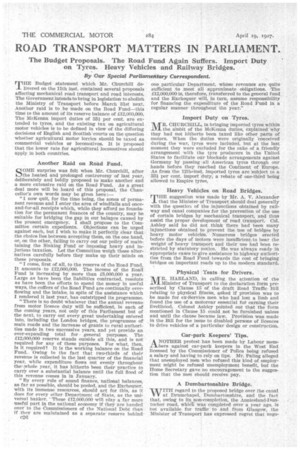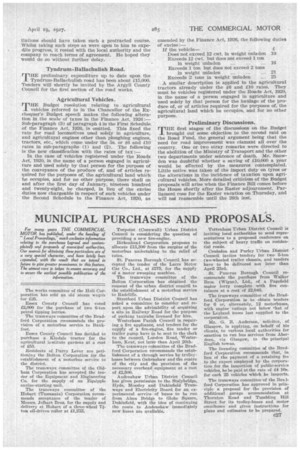ROAD TRANSPORT MATTERS IN PARLIAMENT.
Page 48

Page 49

If you've noticed an error in this article please click here to report it so we can fix it.
The Budget Proposals. The Road Fund Again Suffers. Import Duty on Tyres. Heavy Vehicles and Railway Bridges.
By Our Special Parliamentary Correspondent.
THE Budget statement which Mr. Churchill delivered on the 11th inst. contained several proposals affecting mechanical road transport and road interests. The Government intends to bring in legislation to abolish the Ministry of Transport before March 31st next. Another raid is to be made on the Road Fund—this time to the amount of its reserve balance of £12,000,000. The McKenna import duties of 331 per cent, are extended to tyres, and the existing tax on agricultural motor vehicles is to be defined in view of the differing decisions of English and Scottish courts on the question whether agricultural motor lorries should be taxed as commercial vehicles or locomotives. It is proposed that the lower rate for agricultural locomotives should apply in both countries.
Another Raid on Road Fund.
SOME surprise was felt when Mr. Churchill, after the heated and prolonged controversy of last year, deliberately and boldly proposed to make another and a more extensive raid on the Road Fund. As a great deal more will be heard of this proposal, the Chancellor's own words may be given here:—
"I now quit, for the time being, the zones of permanent revenue and I enter the area of windfalls and onceand-for-all receipts which, while they afford no foundation for the permanent finances of the country, may be suitable for bridging the gap in our balapce caused by the present emergency. I shall propose to the Committee certain expedients. Objections can be urged against each, but I wish to make it perfectly clear that the choice lies between accepting them, on the one hand, or, on the other, failing to carry out our policy of maintaining the Sinking Fund or imposing heavy and injurious taxation. Let the Committee weigh these alternatives carefully before they make up their minds on these proposals.
"I come, first of all, to the reserve of the Road Fund. It amounts to £12,000,000. The income of the Road Fund is increasing by more than £3,000,000 a year. Large as have been the liabilities contracted, resolute as have been the efforts to spend the money In useful ways, the coffers of the Road Fund are continually overflowing and the intake, in spite of the assistance which I rendered it last year, has outstripped its programme.
"There is no doubt whatever that the annual revenue from motor licence duty will be sufficient, in each of the coming years, not only of this Parliament but of the next, to carry out every great undertaking entered into, including the London bridges, the programme of main roads and the increase of grants to rural authorities made in two successive years, and yet provide an ever-expanding total for general purposes. The £12,000,000 reserve stands outside all this, and is not required for any of these purposes. For what, then, is it required? It is the working balance on the Road Fund. 'Owing to the fact that two-thirds of their revenue is collected in the last quarter of the financial year, while expenditure flows out evenly throughout the, whole year, it has hitherto been their practice to carry over a substantial balance until the full flood of this revenue comes in in January.
"By every rule of sound finance, national balances, as far as possible, should be pooled, and the Exchequer, with its immense resources, should act for this, as it does for every other Department of State, as the universal banker. These £12,000,000 will play a far more useful part in the national economy if they are handed over to the Commissioners of the National Debt than if they are maintained as a separate reserve behind one particular Department, whose revenues are quite sufficient to meet all approximate obligations. The £12,000,000 is, therefore, transferred to the general fund and the Exchequer will, in turn, assume responsibility for financing the expenditure of the Road Fund in a regular manner throughout the year."
Import Duty on Tyres.
mR. CHURCHILL, in bringing imported tyres within the ambit of the McKenna duties, explained why they had not hitherto been taxed like other parts of motors. When the duties were originally 'conceived during the war, tyres were included, but at the last moment they were excluded for the sake of a friendly arrangement with the tyre producers in the United States to facilitate our blockade arrangements against Germany by passing all American tyres through our hands before they reached the Continent of Europe. As from the 12th•inst. imported tyres are subject to a 331 per cent. import duty, a rebate of one-third-being allowed to Empire tyres.
Heavy Vehicles, on Road Bridges.
THE suggestion was made by Mr. A. V. Alexander that the Minister of Transport should deal generally With the question of the injunctions obtained by railway and canal companies for the prevention of the use of certain bridges by mechanical transport, and thus assist the proper development of road transport. Col. Ashley said he did not think there had been many injunctions obtained to prevent the use of bridges by heavy motor vehicles. Numerous bridges erected before the days of motors were insufficient to bear the weight of heavy transport and their use had been restricted by statutory notice. He was always ready in appropriate cases to give assistance to highway authorities from the Road Fund towards the cost of bringing bridges on important roads up to the modern standard.
Physical Tests for Drivers.
MR. HARLAND, in calling the attention of the Minister of Transport to the declaration form prescribed by Clause 15 of the draft Road Traffic Bill relating to physical fitness, asked if provision was to be made for ex-Service men who had lost a limb and found the use of a motorcar essential for earning their livelihood. Colonel Ashley pointed out that the form mentioned in Clause 15 could not be furnished unless and until the clause became law. Provision was made in the Bill for the issue to disabled persons of licences to drive vehicles of a particular design or construction.
Car-park Keepers' Tips.
ANOTEIER protest has been made by Labour members against car-park keepers in the West End licensed by the Commissioner of Police being refused a salary and having to rely on tips. Mr. Paling alleged that unemployed men who refused this kind of employment might be refused unemployment benefit, but the Home Secretary gave no encouragement to the suggestion that the men should receive pay.
A Dumbartonshire Bridge.
WITH regard to the proposed bridge over the canal at Drumchapel, Dumbartonshire, and the fact that, owing to its non-completion, the Anniesland-Durttocher road, which was completed over a year ago, is not available for traffic to and from Glasgow, the Minister of Transport has expressed regret that nego
tiations should have taken such a protracted course. Whilst taking such steps as were open to him to expedite progress, it rested with the local authority and the company to reach terms of agreement. He hoped they would do so without further delay.
Tyndrum-Ballachulish Road.
T"preliminary expenditure up to date upon the Tyndrum-Ballachulish road has been about 115,000. Tenders will shortly be invited by the Argyll County Council for the first section of the road works.
Agricultural Vehicles.
THE Budget resolution relating to agricultural vehicles referred to in the Chancellor of the Exchequer's Budget speech makes the following alteration in the scale of taxes in the Finance Act, 1926 :— Sub-paragraph (3) of paragraph 4 in the First Schedule of the Finance Act, 1926, is omitted. This fixed the rate for road locomotives used solely in agriculture, and agricultural engines other than ploughing engines, tractors, etc., which come under the 5s. or £6 and £10 rates in sub-paragraphs (1) and (2). The following is the new classification with the rates of tax:—
In the case of vehicles registered under the Roads Act, 1920, in the name of a person engaged in agriculture and used solely by that person for the purpose of the conveyance of the produce of, and of articles required for the purposes of, the agricultural land which he occupies, and for no other purpose, there shall on and after the first day of January, nineteen hundred and twenty-eight, be charged, in lieu of the excise duties now chargeable in respect of such vehicles under the Second Schedule to the Finance Act, 1920, as amended by the Finance Act, 1920, the following duties of excise:—
If the vehicle—
Does not exceed 12 cwt. in weight unladen Exceeds 12 cwt. but does not exceed 1 ton in weight unladen ... . . Exceeds 1 ton but does not exceed 2 tons in weight unladen ... ... 21 Exceeds 2 tons in weight unladen 25 A similar description is applied to the agricultural tractors already under the £6 and 110 rates. They must be vehicles registered under the Roads Act, 1920, in the name of a person engaged in agriculture and used solely by that person for the haulage of the produce of, or of articles required for the purposes of, the agricultural laud which lie occupies, and for no other purpose.
Preliminary Discussions.
THE first stages of the discussions on the Budget brought out some objection to the second raid on the Road Fund, the general argument being that the need for road improvement was clamant all over the country. One or two stray remarks were directed to the abolition of the Ministry of Transport and the other two departments under sentence of death. Mr. Snowden was doubtful whether a saving of /10,000 a year would be effected by the measures contemplated. Little notice was taken of the import duty on tyres or the alterations in the incidence of taxation upon agricultural vehicles. More detailed criticism of the Budget proposals will arise when the Finance Bill comes before the House shortly after the Easter adjournment. Parliament rose for the Easter vacation on Thursday, and will not reassemble until the 26th inst.












































































































